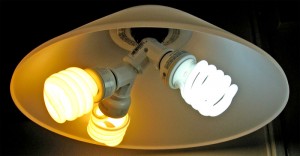
The Belgian consumer organisation Test-Aankoop/Test-Achats published their report on CFLi on May 24th. This organisation buy products from retail sources and have undertaken long term tests with rather disappointing but not unexpected results. This is exactly what individual governments in the EU are supposed to be doing to ensure that the products on the market meet the requirements of the Eco Design legislation however seem to be failing at.
The major problem identified was the time to full light output. Of the lamps tested none achieved 20% of full output within 10 second and none achieved 50% of full output within 30 seconds, the test sample included one lamp claiming to be “Quick Start” however its performance was no better than the others.
Life testing proved equally disappointing, one model of lamp with a claimed 8,000 hour life. 4 out of 5 tested lamps failed within 5,000 hours the remaining lamps only producing 70% of its claimed light output at that time. One example of another type tested failed after 1,800 hours others in that batch that were still operating at 5,000 hours only produced between 20% and 65% of initial light output.
Start up speed, life and light output at end of life are included in the requirements of the Ecodesign legislation. We have to ask why are these not being enforced with the same stringency as the ban on sale of incandescent lamps? The lamp industry is clearly losing interest in CFLi with a major push towards LED based lamp replacements that seem likely to deliver much higher profits than CFLi or incandescent judging by the current excessive retail prices for them.
Test-Aankoop/Test-Achats also tested the recycling process by taking dead CFLi lamps to various container recycling sites. In the 34 recycling sites in Belgium that accept hazardous waste they found that the lamps were deposited in general hazardous waste with the staff at the centre left with the problem of separating lamps for processing by Recupel, the company responsible for lamps an Waste electrical and electronic goods. They also found that many fluorescent lamps were being broken and therefore discharging mercury vapour at the container sites with no real precautions being taken to protect workers or visitors to the sites. They reported their findings to Recupel and the Ministry responsible.
This echoes the problems identified with domestic lamp recycling in Sweden reported about in December
Thanks to Rik Gehysnes and Freedom Light Bulb for alerting me to this story.
Kevan Shaw 6 June 2012
